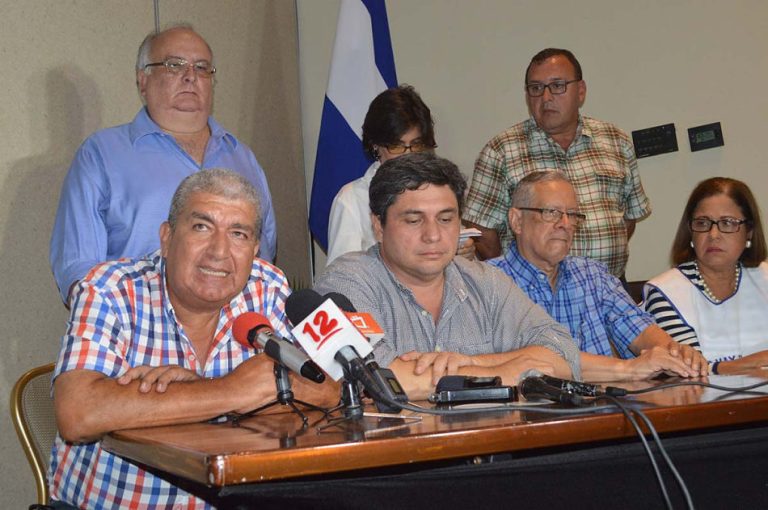5 de diciembre 2016

Children of Exile: The Births “Sowing Hope” in the Camp of Nicaraguan Farmers

PUBLICIDAD 1M
PUBLICIDAD 4D
PUBLICIDAD 5D
Violeta Granera: “We can’t just wipe the slate clean and start anew. We can’t ignore the message the population sent on November 6th”

Masiva abstención supera los cálculos iniciales de la oposición, afirma el Frente Amplio por la Democracia en conferencia de prensa. Confidencial | Arlen Cerda
The Broad Democratic Front (Frente Amplio por la Democracia FAD) has a “road map” ready to present to Luis Almagro, secretary general of the Organization of American States, when he arrives in Nicaragua on Thursday to continue the ongoing “dialogue” with the government of Daniel Ortega.
The FAD proposes that new general elections be held on the same date in 2017 that the municipal elections are scheduled. Violeta Granera, former vice presidential candidate whose candidacy was outlawed through a political decision of Daniel Ortega, now coordinates the FAD. She assured us that they have: “a political proposition and a legal proposal for finding our way out of this situation.”
“The heart of the proposal is that we can’t just wipe the slate clean and start anew,” Granera sustained on the Esta Semana (“this week”) television show. We have no way, ethically, to ignore the message that the population sent on November 6. The political leader and ex-president of the “Movement for Nicaragua” [Movimiento por Nicaragua] was referring to the high level of abstention registered in the voting on November 6. According to the FAD and other political and civic organizations, abstention reached 70%. The official statistics presented by the Electoral Tribunal put the abstention rate at 50%.
“We’re saying that if people didn’t vote it was because they rejected that electoral farce. And if there weren’t really any elections, what’s left? To hold elections. There’re several possible alternatives and we’re flexible, but the proposal is to create conditions next year so that the national elections can be repeated together with the municipal ones,” explained Granera.
According to the FAD’s vision, new general elections are “the gateway to all of the reforms that have to be made” in Nicaragua. The movement, which brings together part of the outlawed opposition with organizations of civil society, maintains that the “this isn’t only an electoral issue.” Rather, the fact that there were no free, transparent and competitive elections is the result of the “dismantling of the rule of law.”
Granera noted that from the time they began the campaign of calling on people not to vote, this has been their constant objective. The FAD wanted “to demonstrate the illegitimacy of the circus they put on,” but also to maintain their demand for elections that complied with international parameters: competitive, transparent and including national and international observation.
“There’s a road that leads there, and we understand that perfectly. But we need to begin traveling along that road…What we’re absolutely opposed to, is the suggestion that we wipe the slate clean and start over. The impunity with which all of these human rights have been violated, including political rights, is what has us in this situation,” Granera insisted.
She added that the proposal is ethical as well as political. “We need to say ‘enough’ to this total deterioration of the rule of law, and also to the determination of the elites and those at the top to ignore the democratic culture that the people have initiated,” she asserted.
On Monday, Citizens for Freedom, the organization associated with Eduardo Montealegre, requested that the Supreme Electoral Council grant them their legal status as a political movement. This has been interpreted by some political analysts as illogical: to beg legal status from the same system that snatched their space on the ballot away in the recent elections under which the National Coalition for Democracy was running.
Although they don’t know the schedule of the OAS delegation that Almagro heads, Granera said that a FAD delegation would meet with them. She also stated that she would request another audience for the opposition deputies who were deposed by order of the Ortega government. Another group of mayors was also scheduled to be received this Tuesday.
Granera announced a joint march to be held on December 1st with the farmers from the anti-canal movement. The producers were to being arriving Tuesday, November 29, and will hold a vigil and later join in the march with organizations allied with the FAD and citizens from the general population.
Granera doesn’t believe that it will be easy to hold back the rural producers who will be traveling to Managua. This Monday, several of those local leaders have denounced the militarization in Río San Juan and Nueva Guinea departments that have formed the hard core of the anti-Canal protest. Granera stated that they chose this date for the march to coincide with the OAS visit, since to some extent, this might reduce the risk of repression on the part of the Ortega government.
She called on private enterprise as represented in the High Council of Private Enterprise (COSEP) and other trade unions to “take an attitude that is less aimed at issuing declarations and more active” regarding the demand for free and transparent elections.
“Sooner or later, the large business owners are going to have to understand that we can’t leave the struggle for Nicaragua on the shoulders of the farmers, that in the end it’s the struggle of all of us. The situation in Nicaragua has always rested on the rural residents. They’ve suffered most of the deaths, and put up all the effort,” concluded the former vice presidential candidate.
This article has been translated from Spanish by Havana Times.
PUBLICIDAD 3M
Periodista. Destaca en cobertura a violaciones de derechos humanos: desplazamiento forzado, tráfico ilegal en territorios indígenas, medio ambiente, conflictos mineros y ejecuciones extrajudiciales. Premio Iberoamericano Rey de España 2018.
PUBLICIDAD 3D